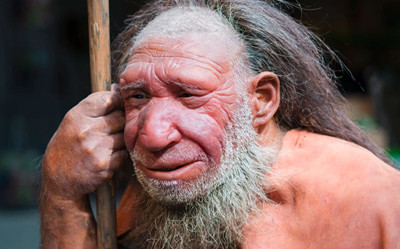(单词翻译:单击)
听力文本
Was Life Harder for Neanderthals or Early Humans?
Neanderthals are extinct, but they were the closest relative of modern humans.
Up until about 30,000 years ago, human beings shared the Earth with Neanderthals. The two species were so close that they sometimes mated.
Scientists have long believed that life for Neanderthals was more dangerous and stressful than it was for humans during this period. Some studies have suggested that Neanderthals suffered high injury rates. Scientists have blamed the high rates on social violence, their hunting methods, attacks by meat-eating animals and the dangers of travel in snow and ice.
Katerina Harvati is with the University of Tuebingen in Germany. She studies the evolution of Neanderthals and modern humans.
Harvati believes the Neanderthals probably did face more dangers than humans do today. But she and other researchers wanted to know if that was true when the two species shared the planet tens of thousands of years ago.

To do that, she and her research team studied evidence of head injuries in fossilized Neanderthal remains. They examined information from earlier studies of fossils from western Eurasia. The skull bones were from about 80,000 to 20,000 years old.
The team looked at information in 295 skull fossils from 114 individual Neanderthals. They also examined 541 fossils from the heads of 90 members of our own species, Homo sapiens.
The researchers found the injury rates were about the same in the two groups. The findings were published in the journal Nature. It also published a commentary on the study by Marta Mirazon Lahr of Cambridge University in England.
She noted that the findings dispute the idea that the behavior of Neanderthals led to increased danger and risk in their lives. She also said that the study is not the final word because it only examined injuries to the head.
Scientists still have to identify the causes of all injuries and how the injured were cared for. That could give us more understanding into the behavior of both Neanderthals and ancient humans, she wrote.
I'm Dorothy Gundy.
重点解析
重点讲解:
1. blame on 责怪;怪罪;归咎于;
Police are blaming the accident on dangerous driving.
警方把事故原因归咎于危险驾驶。
2. look at (尤指专家)检查,察看;
The implications of the new law will need to be looked at.
新法规可能造成的影响需要仔细研究一下。
3. lead to 招致;致使;导致;
The tough market would lead to 400 jobs being cut in the first half of this year.
市场形势严峻,将导致今年上半年400个职位的削减。
4. care for 照料;照顾;护理;
She moved back home to care for her elderly parents.
她搬回家住,好照料年迈的双亲。
参考译文
尼安德特人的生活更艰难还是早期人类的生活更艰难?
尼安德特人已经灭绝,但是他们是现代人类的近亲。
一直到大约3万年前,人类一直与尼安德特人共同生活在地球上。这两种物种关系极为密切,因此他们有时会交配。
科学家长久以来一直认为,与同一时期的人类相比,尼安德特人的生活要更加危险,压力也更大。一些研究表明,尼安德特人的受伤率很高。科学家将高受伤率归咎于社会暴力、尼安德特人的狩猎方式、肉食动物的袭击以及在冰雪天气出行的危险。
卡特琳娜·哈瓦蒂来自德国蒂宾根大学。她主要研究尼安德特人和现代人类的进化。
哈瓦蒂认为,尼安德特人面临的危险可能的确比现代人类高。但是她和其他研究人员想知道,这两种物种数万年前共同生活在地球上时,情况是否也是如此。
为了弄清楚这一点,她和她的研究团队对尼安德特人化石遗骸的脑部损伤证据进行了研究。他们查看了早期研究提供的信息,这些研究关注的是在欧亚大陆西部地区发现的化石。研究中涉及的头骨距今约8万至2万年。
该团队研究了114名尼安德特人的295块头骨化石。他们还研究了90名智人的头骨化石。
研究人员发现,两组的受伤率大致相同。这项研究发表在《自然》期刊上。该期刊还刊登了英国剑桥大学的玛尔塔·米拉松·拉尔对这篇研究发表的评论。
她指出,这项研究推翻了“尼安德特人的行为导致他们生活中的危险和风险增加”这种想法。她还表示,该研究并不是最终结论,因为研究只比较了头部的损伤情况。
科学家仍要确定所有损伤的原因以及治疗损伤的方法。她写道,这会使人们更加了解尼安德特人和古代人类的行为。
多萝西·甘迪报道。
译文为可可英语翻译,未经授权请勿转载!


